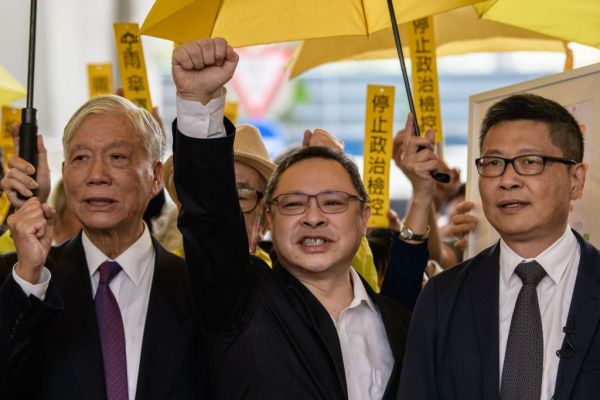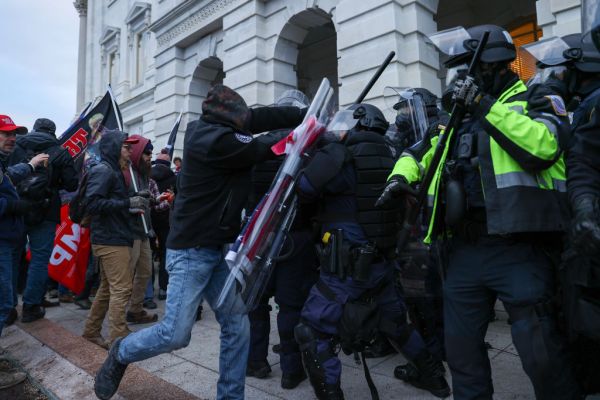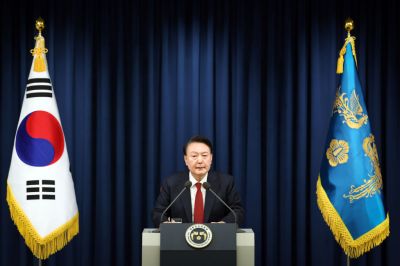Happy Thursday! Attention Dispatch Premium members (and those of you on the fence about becoming Dispatch Premium members): We’re hosting our first Dispatch Premium Town Hall with Steve Hayes and Jonah Goldberg on Tuesday, December 10 at 8 p.m. ET, providing members with an opportunity to interact directly with The Dispatch’s co-founders in an ask-us-anything Zoom call. What do they think of Trump’s Cabinet nominations so far? What’s on the horizon for the 119th Congress? How are they sourcing up for a very different Washington?
We’ll send out more details in the coming days, including an RSVP link exclusively for Dispatch Premium members. If you’d like to attend this special live town hall, be sure to join Dispatch Premium before next Tuesday!
Quick Hits: Today’s Top Stories
- French Prime Minister Michel Barnier was ejected from office on Wednesday after losing a no-confidence vote in the French National Assembly, making his tenure as prime minister the shortest in French history. The far-right National Rally party and the far-left New Popular Front group joined forces to oust Barnier’s centrist coalition, allied with French President Emmanuel Macron, over their opposition to austerity measures in the prime minister’s proposed budget. Macron must now name a new prime minister, who will be tasked with passing a new budget by a December 21 deadline. Macron had told reporters on Tuesday that he did not believe the government would fall, adding that he would not resign and planned to serve until “the very last second of my term.” As a separately elected president, Macron’s term is not dependent on the status of the governing coalition.
- The South Korean Democratic Party, the main opposition to the government of President Yoon Suk Yeol, began impeachment proceedings against Yoon on Wednesday after a brief period of martial law ended in the early hours of Wednesday morning. On Tuesday, Yoon declared the country to be in a state of martial law after saying that “anti-state” opposition forces sympathized with North Korea, creating dramatic scenes around South Korea’s Parliament building as protesters and lawmakers faced off with security services.
- Nika Gvaramia—the leader of the Georgian opposition party, Coalition for Change—was knocked unconscious on Wednesday in a scuffle with police and detained, according to his party. The arrest comes after a recent decision by Prime Minister Irakli Kobakhidze—whose Georgian Dream party’s success in October elections was decried as rigged by opponents—to withdraw the nation’s bid for European Union membership sparked protests in the capital of Tbilisi. Opposition leaders say that police raided party offices and activists’ homes on Wednesday as part of a government crackdown on protests.
- The surprise offensive launched by Syrian rebels last week reached the western Syrian city of Hama on Wednesday, as the coalition opposing dictator Bashar al-Assad fought pro-government troops for control of the city, which lies on a major supply route linking Iran and Hezbollah. The rebels are led by the Islamist group Hayat Tahrir al-Sham, formerly affiliated with al-Qaeda, and the coalition includes other Islamist and more moderate factions. On Tuesday, a Pentagon spokesman said that U.S. forces in Syria conducted an attack in “self-defense” on unknown assailants—operating in an area used by Iranian-backed militias and government forces—who fired rockets and mortars at U.S. and coalition positions.
- The chief of staff to Ukrainian President Volodymyr Zelensky was reportedly in Washington on Wednesday to build contacts with officials from the transition team of President-elect Donald Trump. According to Reuters, the official, Andriy Yermak, met with Trump’s presumptive national security adviser, Mike Waltz, as well as his Ukraine envoy, retired Lt. Gen. Keith Kellogg.
- President-elect Trump announced on Wednesday that he had picked economist Peter Navarro to serve as the White House’s Senior Counselor for Trade and Manufacturing. In a Truth Social post, Trump said that Navarro, a committed protectionist who served as a top trade adviser in the first Trump administration, would have a mission “to help successfully advance and communicate the Trump Manufacturing, Tariff, and Trade Agendas.” Navarro served a four-month federal prison sentence earlier this year for defying a congressional subpoena to testify in front of the House committee investigating the January 6 attacks on the U.S. Capitol.
- Trump also announced on Wednesday that he had picked Paul Atkins to lead the Securities and Exchange Commission (SEC) and Jared Isaacman to lead NASA. Atkins, who has served before as SEC commissioner under President George W. Bush, is known as a strong advocate of cryptocurrencies and digital assets. Isaacman, the billionaire CEO of the payment processing company Shift4 Payments, has helped finance and lead two private SpaceX missions.
- The Associated Press on Wednesday called the final outstanding U.S. House race in the 2024 elections, projecting Democratic challenger Adam Gray as the victor in California’s 13th Congressional District, ousting Republican incumbent Rep. John Duarte. The outcome brings the Republican majority in the House of Representatives to an incredibly narrow 220-215, set to at least temporarily shrink further as GOP Reps. Mike Waltz, Elise Stefanik, and Matt Gaetz depart the chamber for spots in the Trump administration or on Cameo.
- Brian Thompson, the CEO of UnitedHealthcare, one of the nation’s largest health insurance companies, was fatally shot on Wednesday morning in New York City. Thompson was murdered by a waiting gunman in what police are calling a “brazen, targeted attack” while he was walking outside a hotel in midtown Manhattan. A manhunt has been launched for the killer, who was captured on video by surveillance cameras fleeing on a Citi Bike into Central Park.
The Nuclear Option

When South Korean President Yoon Suk Yeol visited the White House on a state visit in the spring of 2023, he broke into song during dinner, offering his rendition of Don McLean’s famous 1971 song, “American Pie.”
That song was apparently not the only thing from the 1970s for which he was feeling some nostalgia.
On Tuesday, Yoon declared martial law in South Korea in a surprise decision that recalled the last time that happened: 1979, in South Korea’s military dictatorship days. Tuesday’s measure was short-lived—the National Assembly swiftly rejected it—but it still threw the country into chaos. South Korean lawmakers are now looking to impeach Yoon, whose approval rating dropped below 20 percent in recent weeks, with lots of questions remaining about what the episode means for the future of South Korean democracy and its international alliances in the shadow of a belligerent North Korea and China.
Late on Tuesday evening in South Korea, Yoon took to the TV to make his stunning declaration. And he didn’t mince words, even in the first line of his speech: “Honorable citizens, as President, I appeal to you with a feeling of spitting blood,” the English translation of his televised address reads.
He went on to accuse members of the National Assembly of obstructing the work of the government and of going too far in attempting to impeach members of Yoon’s administration. “The government is paralyzed, and the people’s sighs are growing,” he said. “Our National Assembly has become a den of criminals and is attempting to paralyze the nation’s judicial administration system through legislative dictatorship and overthrow the liberal democracy system.”
Yoon told citizens that the declaration was an effort “to defend the free Republic of Korea from the threats of North Korean communist forces and to eradicate the shameless pro-North Korean anti-state forces that are plundering the freedom and happiness of our people and to protect the free constitutional order.” He didn’t offer specific accusations or evidence, though the leader of the largest opposition party, the South Korean Democratic Party, Lee Jae-myung, was indicted earlier this year on bribery charges apparently related to money transfers to North Korea to the tune of $8 million. Yoon narrowly defeated Lee in the 2022 presidential election.
South Korea had not been under martial law since it became a democracy. In 1979, the military dictator Chun Doo-hwan used the mechanism to stage a coup following the assassination of President Park Chung Hee, also a military dictator. In fact, Yoon once found himself in hot water for saying Chun—whose forces massacred protesters—was “good at politics.”
In theory, the martial law declaration temporarily put the military in charge of the country, suspending political activity and putting restrictions on the media. In practice, there weren’t any signs of the military disrupting free media in the country, but soldiers were almost immediately deployed to the National Assembly late on Tuesday evening following Yoon’s address. They surrounded the building and tussled with protesters who also took to the street shortly following Yoon’s announcement. “The people should defend this nation,” Lee, the opposition leader, said on his way to the National Assembly on Tuesday night. “Please come to the National Assembly.”
Members of the legislature convened, barricading themselves inside the large assembly room with couches and other furniture. At around 1 a.m. on Wednesday morning, the 190 members of the 300-seat parliament who were present voted unanimously to overrule Yoon’s decree, which they had the power to do. “There’s a very strong lingering memory of the military rule era and of the lawless use of martial law, and there’s a widespread popular revulsion against such tactics,” Nicholas Eberstadt, the Henry Wendt chair in political economy at the American Enterprise Institute, told TMD. “People in South Korea really do want to live under a democratic system.”
And only a few hours after Yoon first declared military rule, the bizarre episode was over. The president relented and at around 5 a.m., the South Korean cabinet lifted martial law. On Wednesday morning, Defense Minister Kim Yong-hyun fell on his sword, taking responsibility for the order to the military to enact martial law and resigning.
The incident apparently left even close aides utterly bewildered. “It’s an astonishing act of political self-jiu jitsu,” said Eberstadt, who studies North and South Korea. “In the most parsimonious and expeditious sort of way, he’s managed to discredit himself, his party, his ideals, his objectives and to compromise the future of constitutional rule in South Korea against an opposition party dominated by leftists who would love to change the constitution into something closer to a people’s democracy.”
And for what?
Though Yoon claimed the declaration was an effort to stamp out influence from outside, it seems much more likely it was a method to neutralize political opposition in an era of gridlocked government. Yoon was already embattled, facing allegations of corruption related to gifts for his wife. Plus, he’s something of a gaffe machine. In 2022, he was caught on a hot mic seemingly calling members of the U.S. Congress a Korean word that roughly translates to “idiots.”
Yoon—the country’s former top prosecutor who had little experience in politics before narrowly winning the presidency in 2022—was saddled with an opposition parliament when his party lost legislative elections in the spring. Since then, the left-wing Democratic Party has blocked key legislative priorities and tried to impeach several members of Yoon’s cabinet over their handling of the first lady’s alleged corruption.
On one hand, it’s possible that months of gridlock had him feeling embittered. On the other, he could have been fed up, as a prosecutor at heart, with what he saw as efforts by Lee and the opposition to avoid prosecution in the several cases pending against his political foe.
“He is frustrated, understandably,” by the situation in the National Assembly, said Patrick Cronin, the Asia-Pacific security chair at the Hudson Institute. “But that was the result of democratic votes. Yoon’s party lost the majority in the April vote. They knew it was crucial. They knew they had to retain the majority or suffer gridlock. And they lost and they’re suffering gridlock.”
“He decided, ‘Hey, I’ve got a nuclear option, and I’m going to use it,’” Cronin added. “And then he had to back off, and now he’s paying the consequences, and we’re all paying the consequences, because nobody benefits in the U.S. from having South Korea suffer a political crisis.”
Indeed, the U.S. and South Korea have moved closer in the last several years. Yoon, particularly hawkish on North Korea, spearheaded the trilateral military alliance established last year between the U.S., South Korea, and Japan—remarkable because the latter two have decades-long animosity—that has provided a muscular bulwark against Chinese and North Korean aggression.
South Korea’s political crisis throws those alliances into flux. “Between some of the impulsive things that our former and future president has done in the past, and the impulsive thing that South Korea’s current president just did yesterday, we can see how the U.S.-[South Korea] alliance may come under a lot of strain in the months and years immediately ahead,” Eberstadt noted. “And I don’t think that people in the United States may appreciate the importance of that alliance until, God forbid, it disappears.” To wit, U.S. and South Korean officials reportedly postponed a meeting Wednesday about nuclear deterrence issues on the peninsula.
It’s also possible that Pyongyang could take advantage of this moment of chaos in South Korea at a moment when the north is emboldened by its growing association with Russia.
The next few days, weeks, and months will likely be tumultuous. The parliamentary opposition moved on Wednesday morning to impeach Yoon, which would require 200 votes in parliament. Yoon’s People Power Party holds 108 seats, meaning at least eight of Yoon’s fellow party members would have to vote against him to successfully oust him. If he were impeached, six of the nine justices on the Constitutional Court would have to affirm the decision. If they did, there would be a special election within 60 days to replace Yoon.
But that’s far from certain. Yoon could fold under pressure to resign before the process even gets going, of course, or he could hang on and try to eke out a few victories on his foreign policy agenda—where he’ll have the most room to maneuver—before the end of his five-year term.
No matter what, Yoon’s insane gambit backfired. “The great thing about having a populist—or somebody who’s an outsider—become the leader of a democratic government is they bring in fresh thinking,” said Cronin. “The bad news is that they don’t know the old thinking. And the old thinking sometimes is very important, because it’s how you set up expectations and what’s really within the bounds of what’s thinkable.
Without that experience, Cronin added, “You really fail to anticipate the kind of harsh blowback. And he did.”
Worth Your Time
- You’ve heard of petrostates—countries where most economic growth is driven by sales of oil—but how about weight-loss states? In his Substack, Apricitas Economics, economist Joey Napolitano explores how almost all of Denmark’s economic growth is now driven by sales of the popular weight-loss drugs Ozempic and Wegovy, both made by the Danish pharmaceutical company Novo Nordisk. “Rising drug exports are currently driving the majority of Denmark’s GDP growth—since late 2021, Danish GDP has increased by 3.6%, but economic growth would have been 0% without the contribution of rapid increases in pharmaceutical manufacturing output,” he wrote. “The pharmaceutical boom has been so strong that it has almost singlehandedly made Denmark one of the fastest-growing economies in the European Union.”
- Left-wing writer Freddie DeBoer took to the pages of the conservative City Journal to write about one of the most overlooked factors driving America’s homelessness crisis: the deep commitment to personal autonomy on the part of homeless activists. The result, he argues, is human misery, not freedom. “If you found a friend sleeping in filth under a bridge, and you knew him to be under the influence of a powerful drug, would you just walk away and leave him there, under the logic that he was simply expressing his freedom? You wouldn’t,” he argued. “You would intuitively recognize that the influence of the drug makes genuine freedom impossible. And yet every day, we walk by people who have been crushed by schizophrenia, bipolar disorder, or other mental illnesses and live in squalid, dangerous conditions on the streets. Those claiming to be their advocates forbid doing what’s necessary to ensure effective treatment of those conditions.”
Presented Without Comment
Mediaite: Kash Patel Threatens to Sue Ex-Pence Aide For Saying On MSNBC He’s Unfit to Lead the FBI
Also Presented Without Comment
Associated Press: Police Recover a Stolen Van With 2,500 Pies After a Chef’s Appeal, but They Are Too Damaged To Eat
In the Zeitgeist
New York Jets quarterback Aaron Rodgers is known (Editor’s Note: was known) for his stellar play on the field, but he’s always had some … strange … opinions off of it. If you ever wanted to learn how ayahuasca can be an integral part of a top athlete’s training regimen, Netflix’s upcoming documentary, Enigma, is for you:
Toeing the Company Line
- In the newsletters: Scott beefed with an anti-globalization economist, Nick argued (🔒) that Trump nominating Florida Gov. Ron DeSantis to lead the Pentagon would make sense for both men, and Jonah wrote about (🔒) the Hunter Biden pardon and the new theory of moral relativity.
- On the podcasts: Jonah is joined by Wall Street Journal columnist Sadanand Dhume on The Remnant to discuss what he learned on his recent trip to India, and on Advisory Opinions, Sarah and David break down the recent case before the Supreme Court about flavored vapes before digging into birthright citizenship.
- On the site: Charles Hilu reports on the bind in which Kash Patel’s nomination to lead the FBI will put vulnerable Republican senators, Brian Albrecht argues overzealous antitrust enforcement can stifle innovation and harm consumers, and Kevin Williamson draws an extended parallel between Vikings and the Deep State as only he can.
Let Us Know
Does Yoon’s move seem like a reasonable reaction to his legislative woes? How should Biden and Trump engage with Yoon from here on out, assuming his presidency survives this episode?








Please note that we at The Dispatch hold ourselves, our work, and our commenters to a higher standard than other places on the internet. We welcome comments that foster genuine debate or discussion—including comments critical of us or our work—but responses that include ad hominem attacks on fellow Dispatch members or are intended to stoke fear and anger may be moderated.
With your membership, you only have the ability to comment on The Morning Dispatch articles. Consider upgrading to join the conversation everywhere.